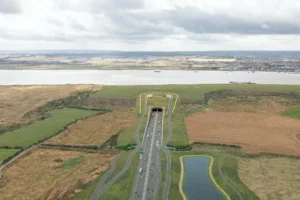More Highways England are likely to be accelerated under Project Speed, according to its Project Director, David Haimes.
Other roads schemes will follow the recent acceleration of the A66 Transpennine route as part of the initiative.
Mr Haimes told NCE’s Future of Roads conference, which took place last week, that Highways England is looking at speeding up delivery of other projects.
“The Project Speed principles of building roads quicker and faster but also considering health and s afety and social capita is very much something we are reviewing on schemes,” he said. “The A66 was very much a path finder scheme. We had a great opportunity to test some of that thinking there.”
But, he said, there isn’t a “one size fits all” solution.
“It’s about working out target interventions are for each scheme,” he said. “There will be a lot more talk about this in the next couple of months. But the short answer is yes, we need to move faster and also consider the health, safety and wellbeing of the people on that journey.”
The scheme includes the construction of a new bypass, dualling along existing sections of road and major junction improvements.
Highways England has originally forecast construction to take 10 years, however the government’s National Infrastructure Strategy revealed that a Project Speed review cut that timeline in half with construction now due to last five years, said an NCE report.
The time savings have been made by increasing modular and offsite design and construction practices.
“All the similar activities need to be undertaken,” Mr Haimes said. “With site investigation and archaeology work normally the approach is to phase these works but on the A66 it was all undertaken within the preliminary design stage.
“This involves getting access to land through negotiations with landowners to gain the information to feed into the design, so we can design once and produce a robust development consent order (DCO). This also enabled the DCO to be brought forward. “
He added: “With enabling works on site, close conversations with our statutory utilities partners have enabled us to gain access to start works earlier and get some risk critical activities – including archaeology and statutory utilities – removed before the main works progress.”





















